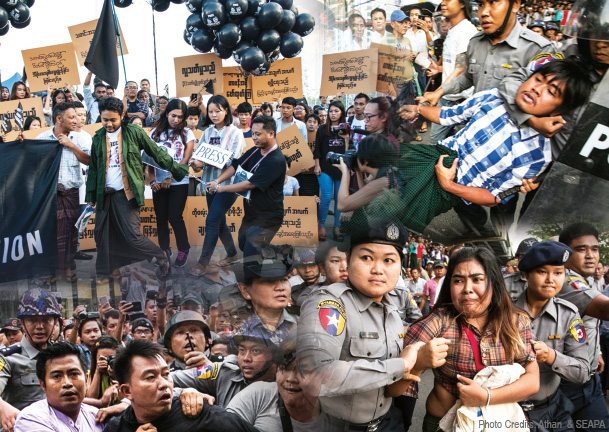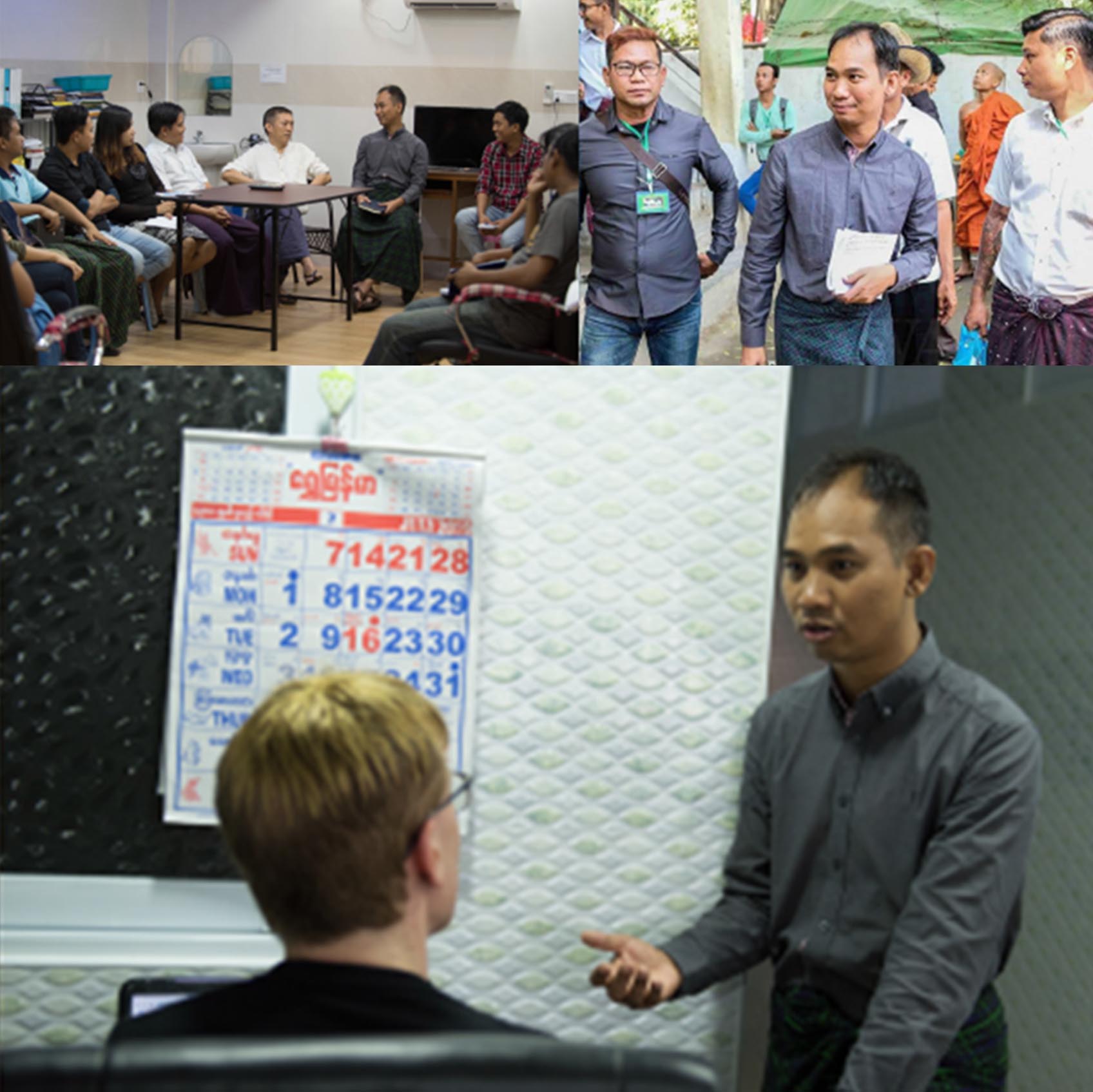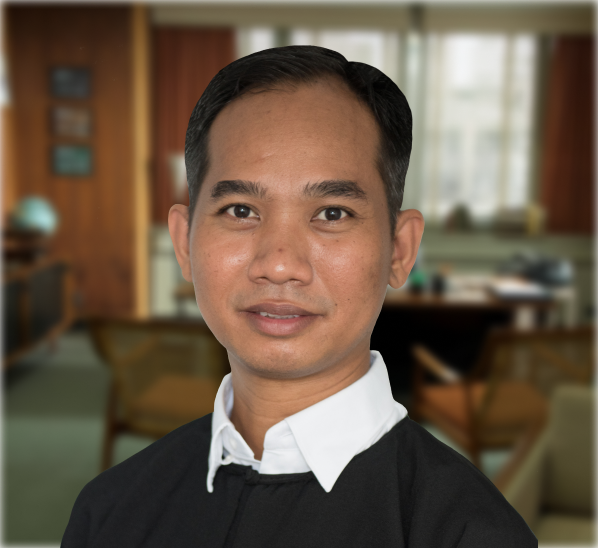


Myanmar has one of the most challenging environments for the practice of journalism in Asia. With its history of military rule and weak civic institutions, the effort to build a strong, independent, and socially responsible press has to contend with draconian laws, rabid intolerance, repression and persecution. It is an environment that calls for journalists of uncommon will, professional independence, and a strong sense of justice.
Such a journalist is forty-one-year-old KO SWE WIN. Born to a poor family in Yangon, he grew up in politically turbulent times and fell victim to state repression early on. In 1998, he was a university student when he was arrested with sixty-seven others for participating in a student demonstration and distributing propaganda materials against the ruling military junta. Sentenced to twenty-one years in jail, he was tortured and starved but would turn prison into a learning experience. He studied English, deepened his Buddhist faith, and did a lot of meditation. Released after seven years in prison, he studied journalism, doing an online undergraduate program and with a scholarship, finished a master’s degree in journalism at Hong Kong University in 2009. He worked for a magazine in Thailand, and then, intent on being “where the action was,” returned to Yangon in 2012.
In Yangon, he started as a stringer for Al Jazeera and New York Times and even set up a short-lived, self-financed internet news service. The first important opportunity came when Myanmar Now was launched in 2015, with seed financing from the Thomson Reuters Foundation. Myanmar Now is an independent online news service focused on long-form investigative reports in both Burmese and English, available for syndication. With SWE WIN as editor-in-chief since 2016, the news service has built a strong reputation for well-researched, in-depth articles on critically selected, underreported human rights and social justice issues.
SWE WIN has continued to face daunting challenges. In 2017, he criticized a powerful, ultranationalist Buddhist monk, Ashin Wirathu, for purveying “hate speech” and publicly commending the killer of a Muslim human rights activist. Wirathu, SWE WIN wrote, had desecrated Buddhism and should be punished for endorsing assassination and fomenting hate. SWE WIN was sued for defamation, physically assaulted by Wirathu’s supporters, and briefly jailed on the trumped-up charge that he tried to leave the country while on bail. Illustrating how the law can be bent by the powerful, the trial was held in a location that required SWE WIN to take a 780-mile road trip to and from the trial, which was purposely dragged out such that SWE WIN had to do a total of seventy-one trips at great personal inconvenience and cost. A case of blatant harassment, the judge finally dropped the case on July 2, 2019 for the plaintiff’s protracted non-appearance at court hearings.
SWE WIN and Myanmar Now draw strength from the fact that they are making a difference. With a current readership of 350,000, the news service is highly regarded for the quality, balance, and depth of its reporting on high-impact issues, including land grabbing, child labor, and abuse of domestic workers. It exposed anomalies in the Myanmar Human Rights Commission; in a political indoctrination program ran by the army for civil servants; in the secret operation of some fifty prison labor camps where prisoners are made to work in quarries and mines; and in the activities of the Association for the Protection of Race and Religion, a movement of xenophobic, anti-Muslim extremists. SWE WIN is encouraged that public awareness has been raised and government has responded positively in a number of cases, punishing officials or changing policies.
A growing problem in Myanmar and the world, SWE WIN says, is “intolerance and hostility towards different races and nationalities being exploited as a political weapon.” “Only the promotion of human rights,” he says, “can help us contain this deplorable trend.”
In electing KO SWE WIN to receive the 2019 Ramon Magsaysay Award for Emergent Leadership, the board of trustees recognizes his undaunted commitment to practice independent, ethical, and socially engaged journalism in Myanmar; his incorruptible sense of justice and unflinching pursuit of the truth in crucial but underreported issues; and his resolute insistence that it is in the quality and force of media’s truth-telling that we can convincingly protect human rights in the world.
First, I would like to thank Ramon Magsaysay Award Foundation for giving me this prestigious award in Asia.
But I feel deeply humbled by the fact that there are so many out there in our country and various parts of the world ”more selfless and more honest than I am but who have been never recognized for the services they render to their respective societies.
I am the seventh person from Myanmar ”and the second journalist ”to receive this award. The first Myanmar journalist and one of the earliest recipients of this award is Mr. Edward Michael Law-Yone, who founded the Nation newspaper in 1948. That was one of the most influential newspapers in Southeast Asia.
After the first military coup in 1962, Michael Law-Yone was jailed for five years and later forced to leave the country. Professional journalism had been lost in our country since then. The state of oppression, which forced Mr. Law-Yone to leave his beloved country, has relaxed to some extent following some democratic changes initiated since 2011.
According to the current constitution, however, the military remains the most dominant force, which controls key ministries and holds one quarter of seats in the legislature.
The predominance of the military’s role, combined with the continued armed clashes in a number of ethnic minorities and the rise of nationalism, is the major challenge facing the independent media in Myanmar. This situation constantly instills a sense of threat into civil life and the news media circle.
But having passed through various political and social turbulences over the past decades, we have developed a great resilience and a tremendous amount of patience for the problems in our country. None of the people I know in Myanmar expect change to happen overnight, but we have a firm belief that we are not on the right path towards democracy and liberty as long as the supremacy of civilian rule has not come into fruition.
In this context, journalism plays a crucial role ”the kind of journalism that seeks the truth, that protects the fundamental rights of human beings, that is not colored by political and religious dogmas and, above all, that is driven not by animosities against anyone or any entity but by a great compassion for the most unfortunate communities and individuals in a society.
Even though an independent press or press freedom is mostly a by-product of a democratic political system, we are confident that the press can play a vibrant causal role for the growth of democracy and liberty in Myanmar and many other countries in Asia.

